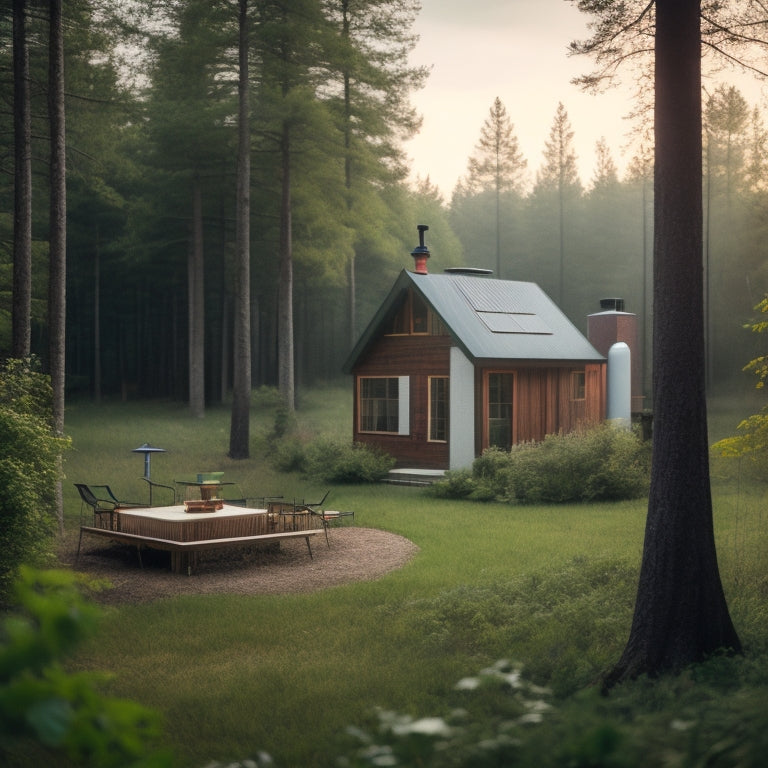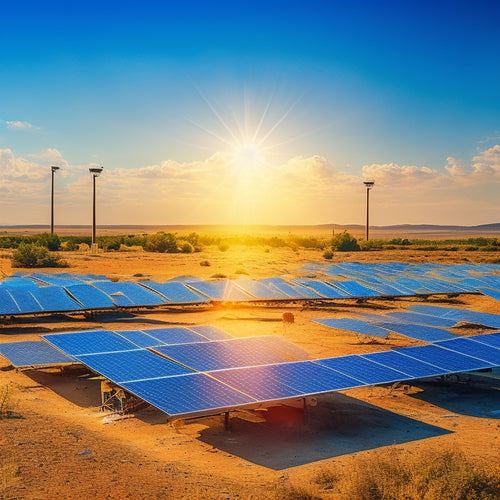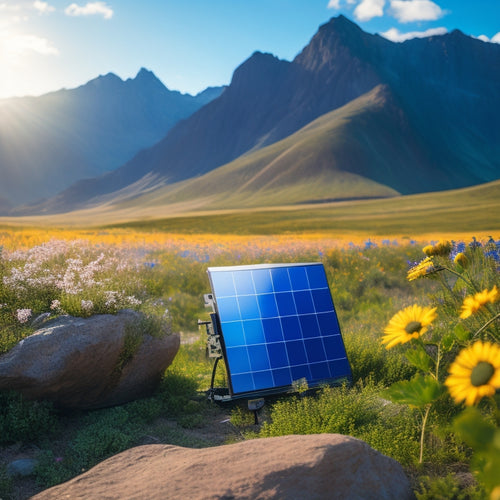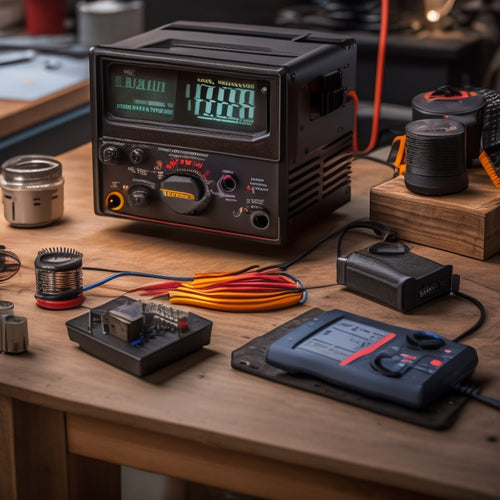
Why Go Off the Grid at Home?
Share
By going off the grid at home, you'll reduce your reliance on public utilities, ensuring a steady power supply even during emergencies. You'll also lower your carbon footprint and environmental impact, promoting sustainable living and supporting eco-friendly solutions. Plus, you'll save money on energy bills by utilizing free energy from the sun and optimizing your energy usage. What's more, you'll enhance your home security with features like smart surveillance and electrified perimeter fencing. As you investigate the benefits of off-grid living, you'll uncover even more ways to take control of your energy independence and create a sustainable future.
Key Takeaways
- Going off the grid at home reduces reliance on public utilities, enhancing self-sufficiency and providing reliable power during emergencies.
- Off-grid living promotes sustainable living, lowering carbon footprint and environmental impact, and supports eco-friendly solutions.
- Investing in alternative energy sources and energy storage solutions can significantly lower energy bills and decrease vulnerability to power outages.
- Off-grid homes can increase security features, such as smart surveillance systems, electrified perimeter fencing, and motion-sensitive outdoor lighting.
- Living off the grid contributes to a cleaner environment, conserves water and reduces waste, and supports preservation of natural resources for future generations.
Benefits of Energy Independence
By opting for energy independence, you're not only reducing your reliance on public utilities but also reaping a multitude of benefits.
With solar energy and battery storage, you'll have a reliable source of power during emergencies, ensuring your family's safety and comfort. This self-sufficient approach to living also promotes sustainable living, reducing your carbon footprint and contributing to a cleaner environment.
By adopting solar technologies, you contribute to a cleaner, greener future, supporting eco-friendly solutions that mitigate environmental degradation.
Furthermore, energy independence allows you to conserve energy and reduce your utility bills. By investing in off-grid technologies, you'll be prepared for any situation, from power outages to natural disasters.
Reducing Reliance on Public Grid
As you shift towards energy independence, you'll likely want to reduce your reliance on the public grid, freeing yourself from the constraints of traditional power systems.
This means investing in alternative energy sources, such as solar energy, to generate electricity for your home. By utilizing solar energy, you can greatly decrease your reliance on the grid, especially during peak sunlight hours.
Additionally, using renewable energy storage solutions, such as deep cycle batteries, allows you to store excess energy generated during the day for use during the night or on cloudy days, contributing to a cleaner environment by lowering carbon emissions.
To guarantee a steady supply of power, consider incorporating battery storage into your system. This will allow you to store excess energy generated during the day for use during the night or on cloudy days.
Lowering Your Energy Bills
Several hundred dollars a year - that's what the average American household spends on energy bills. By going off the grid, you can greatly lower your energy bills and save money. Here's how:
-
You can utilize free energy from the sun using solar panels, reducing your reliance on the grid.
-
Energy storage systems like batteries allow you to store excess energy generated during the day for use at night or during power outages.
-
You can optimize your energy usage by using energy-efficient appliances and lighting.
-
Conducting an energy assessment helps identify areas of improvement and can lead to considerable energy savings.
-
By choosing high-efficiency solar panels, you can maximize your energy output and reduce your energy bills further.
-
You can also reduce energy waste by sealing air leaks and adding insulation to your home.
- With real-time monitoring, you can track your energy usage and make adjustments to optimize your energy consumption.
Environmental Impact of Off-Grid
Your carbon footprint shrinks notably when you go off the grid. By utilizing renewable resources like solar, wind, and hydro power, you greatly reduce your reliance on fossil fuels.
This shift to sustainable living has a significant impact on the environment. You'll produce fewer greenhouse gas emissions, contributing less to climate change.
Additionally, you'll conserve water and reduce waste by implementing efficient systems and recycling practices. As a result, you'll be doing your part to preserve natural resources for future generations.
Increased Home Security Features
How vulnerable is your home to potential threats when you're not around? Going off the grid can greatly enhance your home's security features.
-
Smart surveillance systems can be installed to monitor your property remotely, providing real-time alerts and video footage in case of an intrusion.
-
Perimeter fencing can be electrified to deter trespassers and prevent unauthorized access.
-
Motion-sensitive outdoor lighting can be installed to illuminate potential entry points.
-
Self-sustaining power systems can guarantee your security systems remain operational during power outages.
-
Advanced door and window sensors can detect even the slightest breach, sending instant notifications to your phone or authorities.
Frequently Asked Questions
Can I Still Use My Existing Appliances With Off-Grid Energy Systems?
You can use your existing appliances with off-grid energy systems, but you'll need to verify they're compatible with your solar panel's output and energy storage options, such as batteries or inverters, to confirm a seamless changeover.
Do Off-Grid Homes Require Special Maintenance and Upkeep?
You'll need to perform regular checks on your off-grid system to guarantee peak performance and sustainability. This includes monitoring renewable energy output, battery health, and system efficiency to maintain a reliable and efficient off-grid lifestyle.
Can I Install Off-Grid Energy Systems Myself or Hire a Professional?
Ah, you're a skilled electrician, plumber, and carpenter, right? If not, it's best you don't DIY installation, risking electrical shocks and fires. Instead, hire professional services to guarantee a safe, efficient off-grid energy system that won't leave you in the dark.
How Long Does It Take to Install an Off-Grid Energy System in a Home?
You'll need to contemplate the installation timeline, which varies depending on the energy capacity required and the complexity of the system. On average, it takes 2-5 days for a small system and 2-6 weeks for a larger, more complex one.
Are Off-Grid Homes More Prone to Power Outages Than Traditional Homes?
You might think off-grid homes are more prone to power outages, but surprisingly, they're not; in fact, you'll enjoy energy independence and sustainability benefits, with backup systems and energy storage ensuring a steady supply of power when you need it.
Related Posts
-

What Happens Without a Charge Controller in Solar Panels
Without a charge controller in your solar panel system, you risk overheating batteries due to overcharging, which can...
-

High-Efficiency Solar Battery Chargers for Remote Areas
High-efficiency solar battery chargers are essential for your off-grid energy needs in remote areas. They maximize en...
-

Key Features of a DC to AC Converter
A DC to AC converter features high efficiency and conversion rates, which reduce energy costs and improve performance...


